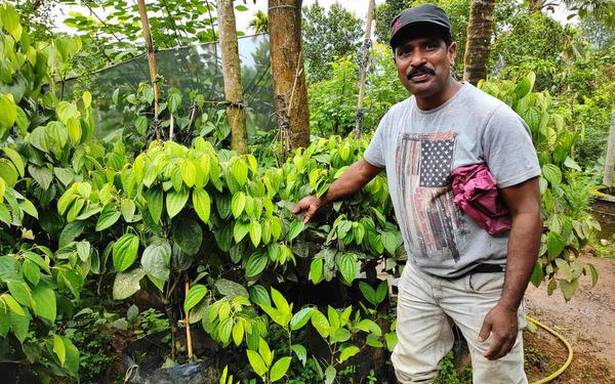Wayanad farmer gets up to 3 quintals of black pepper every year from 23 cents
Muhammadali of Puthukkudy, a farmer at Muttil in Wayanad, is known as the magician of pepper vines among his friends following his huge success in managing grafted bush pepper vines in and around his homestead.
The progressive farmer is growing more than 300 grafted bush pepper vines belonging to six varieties on his pepper garden on 23 cents of land and gets an average yield of two to three quintals of black pepper every year.
Mr. Muhammadali turned to bush pepper cultivation a few years ago after his pepper vines were destroyed in a flood. He used to get more than five quintals of black pepper from 270 pepper vines.
In bush pepper farming, Colubrinum (Piper colubrina), locally called Kattu Thippaly, is used as the stock. A nursery is set up in the garden for raising Colubrinum alone and each of the stock is later grafted with pepper varieties such as Panniyoor 1, Karimunda, Thekken and Kombukkal.
Advantages
Higher survival rate, disease resistance and increased yield are some of the noteworthy features of bush pepper farming, says Mr. Muhammadali. Bush pepper needs less attention compared to the field vines, he says.
Ease of management is another attraction as the farmer can have a look at each and every leaf of the plant that grows in a polythene bag. Another advantage is round-the-year harvest, if the bushes are managed properly, he says.
Mr. Muhammadali follows organic method of cultivation and he has devised a novel bio-fertilizer for his plants. A fermented formulation made of locally available plant leaves, cow dung, neem cake and bone meal act as the main fertilizer for his plants.
Mr. Muhammadali is a role model for every marginal farmer in the State as he is making an attractive income from a small piece of land, says Joseph John, scientist at M.S. Swaminathan Research Foundation.
As nearly 78% of farmers in the country are marginal farmers, the methods and techniques developed by Mr. Muhammadali can be replicated by every farmer, Mr. John says.
Source: Read Full Article

